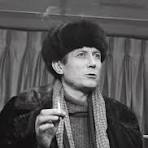

Yevtushenko dedicated this poem to Shostakovich. He was initially approached by Shostakovich in 1961, when the Russian composer was writing a symphony based on Yevtushenko’s poem “Babi Yar.” The two men spent time together discussing both the project and literature in general. “Shostakovich completely changed me as a poet,” Yevtushenko wrote later. “He amazed me with his profound rendering of the poem.” (quoted in Ethel Wilson, Shostakovich, 385-4)_
In 1964 the two worked together again on Shostakovich’s “The Execution of Stepan Razin,” which was based on Yevtushenko’s cantata “The Bratsk Hydro-Electric Station.”
In this poem Yevtushenko acknowledges that he and Shostakovich, as artists in the Soviet Union, are in the same difficult position: needing sometimes to avoid following their conscience in order to stay alive. In this lifelong dilemma, Yevtushenko understands that Shostakovich is a brother: “I kiss your dark hands.” At the same time he argues that he and Shostakovich must still have a conscience.”
The Torments of Conscience
To D. Shostakovich
We are alive and not ready to die,
Therefore we ignore shame,
But conscience stands at every crossroad
Like an invisible Madonna.
With a tramp’s walking sticks and bags,
Her children and grandchildren,
The torments of conscience—strange torments--
Trudge along in a land where conscience is rare.
From gate to gate
From threshold to threshold 10
They wander like kaliki*
With God in their hearts.
Weren’t they the ones who with unending reproach
Rapped surreptiously with dull fingernails
On the thin mica windows of peasants
And with a fist on the mansions of tsars?
Weren’t they the ones who rushed Pushkin
Into the darkness of a blizzard on a rackety troika,
Who drove Dostoevsky to jail,
Who whispered “Run!” to Tolstoy? 20
The executioners understood perfectly well:
“He who torments himself—he’s the troublemaker.
Torments of conscience are dangerous.
We’ll stamp out conscience to eradicate torment.”
But apparently with the sound of alarm bells
Shaking their homes at night,
The executioners themselves were affected
By the dreadful torments of conscience.
So after all, those who protect falsehoods
And who lost their honour long ago, 30
Seem to have the torments of conscience
If not conscience itself.
When no one in the whole world
Is free of guilt, no one,
And someone asks, “What have I done?”
Something can be done with the world.
I don’t believe in the inspiration of prophets
From the second or thousandth Rome;
I believe in the quiet “What are you doing?”
I believe in the harsh “What are we doing?” 40
And on the slippery edge of skepticism
I kiss your dark hands.
Torments of conscience are radiant torments
For my ultimate faith.
Yevgeny Yevtushenko 1966
Translated by John Cobley
* Ancient wanderers who sang spiritual poems and epics.
Leave a Comment